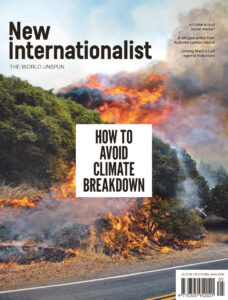
My nine-year-old son, Laurie, looked up at me from the sofa the other day. ‘I know!’ he said, apropos of nothing. ‘What if we found something to put into cars that didn’t make the world too hot?’
I’d been talking to him about climate change while editing the May-June edition of New Internationalist, which is dedicated to understanding how we can avoid irreversible ecological breakdown. My son tends to absorb things quietly and it’s only later you realise that he’s been working them through.
I felt slightly embarrassed or ashamed – it’s hard to place the emotion exactly – as I answered, crushing his light-bulb moment: ‘Well, the thing is, we already know how to make cars run on clean energy. In fact, there’s a way to do almost everything we do now using clean energy. We are, um, just not doing it.’
It’s like the good news and the bad news, all rolled into one. So many of the solutions that can limit climate breakdown are staring us right in the face, but we will need to mobilise like never before to put them into action.
 In our May-June magazine we don’t linger on apocalyptic predictions. Instead this is a pitch for how we preserve a habitable planet (I was inspired, in part, by David Wallace-Wells’ Uninhabitable Earth, which outlines what will happen if we fail).
In our May-June magazine we don’t linger on apocalyptic predictions. Instead this is a pitch for how we preserve a habitable planet (I was inspired, in part, by David Wallace-Wells’ Uninhabitable Earth, which outlines what will happen if we fail).
In the magazine, we look closely at how to go about weening the industrialised world off dirty energy.
I spoke to all sorts of inspirational people working to make this happen right now: scientists and engineers, student strikers and climate warriors from the low-lying Pacific islands, renegade economists, Indian grassroots leaders and South African farmers.
I also looked to the past, to see when governments have pulled off incredible stints in the face of existential threats – whether that’s producing half the world’s GDP to avert the global financial crisis, or re-purposing energy during World War Two (drawing on Rapid Transition Alliance’s research How did we do that?).
The end result is a collection of articles that touch base with all the key climate justice questions of our times: they include a journey to the forgotten coal mining communities of Appalachia to consider what a just transition might look like, a round-up of struggles to keep fossil fuels in the ground globally, and practical ideas showing government and individuals alike how to wringing carbon out of our societies.
I came away from editing this magazine with a feeling of ‘conditional optimism’. I borrowed the concept from the Nobel winning economist Paul Romer, who describes it as the feelings of a child planning to build a tree house, with wood, nails and help from their friends, compared to the ‘complacent optimism’ of a child waiting for presents.
This isn’t about looking on the bright side – that’s as dangerous as calling the end of the world before it’s guaranteed. Rather we believe we can still avoid the worst of climate change because we see the tools, movements and awareness, emerging to help us tackle it. This is a problem that we have the power to overcome. This magazine is our contribution to understanding exactly how to go about it…
To get a copy of the May-June edition of New Internationalist for just £1, go to nin.tl/ClimateOffer.
